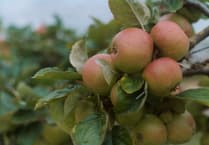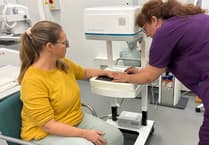MORE than 30 men who left Widecombe-in-the-Moor to enlist for the first world war, returned home safely after serving their country.
On Sunday a Roll of Honour bearing their names will be unveiled by the Rev Geoffrey Fenton during the Remembrance Day Service in St Pancras Church.
Their names were uncovered during painstaking research, mainly by a three-man team from the Widecombe History Group – Peter Rennells, John Kimber and David Ashman – with support from numerous sources.
The village war memorial contains the names of the five men who fell during the conflict, but a record of those who came back was lost years ago.
Believing this was a wrong that should be righted, Mr Rennells and fellow members of the history group set to work finding descendants to find out names to piece together a record of their lives.
A hand-written roll of honour for the living had been displayed in the church porch, but by early 1920 was dilapidated and when it went missing was never replaced.
Mr Rennells said letters in the press at the time said the situation had become a laughing stock with visitors and that it would not cost much to have one printed and framed.
Research has uncovered each man’s home address, next of kin, branch of service, rank and area in which he served.
While it was a Dartmoor farming area, it was strange that so many found themselves in the Royal Navy. One possible theory offered is that farm labourers made good stokers on the steam driven warships.
Research has also produced many unusual stories of wartime experiences, which it is hoped to produce as a book.
Mr Rennells said:?‘Apart from the Public Records Office Kew and the Devon Records Office Exeter, information has had to be sourced locally.
‘Widecombe’s older residents have turned out their attics and photograph albums in the search. The records of the local Royal British Legion have proved invaluable along with census books, electoral registers and school records in the quest for possible names.’
Two of the greatest sources of information have been the Mid-Devon Advertiser and the Western Morning News.
Appeal tribunals for farmers appealing against the loss of their last labourer were much in evidence, particularly in the Newton Abbot area.
The story of Widecombe’s record achievement in the collection of sphagnum moss for wound dressings received a lot of coverage, even in the national press.
Enough information was gathered for the history group to take part in four exhibitions on the village’s involvement in the first world war.
‘Lest We Forget is an expression used in remembrance of those who fell. Now Widecombe can acknowledge those who served and survived, not always in one piece,’ said Mr Rennells.
The history group is continuing its research, and more names are anticipated.
Anyone with information can contact Mr Rennells via [email protected] or telephone 01364 621302.
Alternatively visit www.widecombe-in-the-moor.com/history/.




.jpeg?width=209&height=140&crop=209:145,smart&quality=75)
Comments
This article has no comments yet. Be the first to leave a comment.